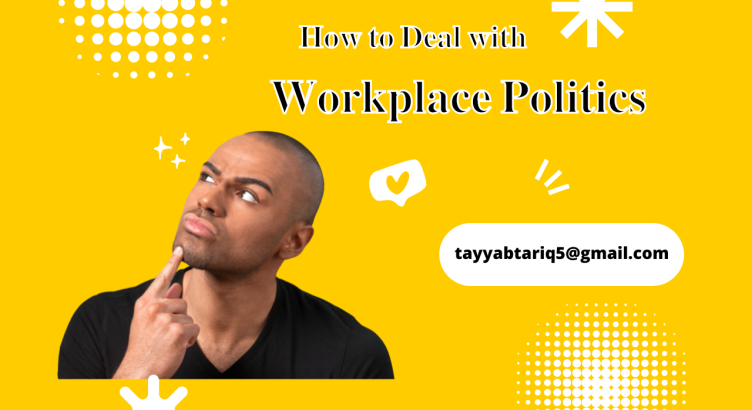Office politics and toxic work environments are sometimes considered an unavoidable business component. However, they may quickly develop into a poisonous workplace atmosphere if left unchecked.
An organisation that tolerates bad workplace conduct fosters drama and insecurity, reducing productivity, demoralising employees, and promoting employee turnover.
A wise employer should be proactive in creating clear boundaries to limit office politics and develop an environment that discourages harmful behaviour.
As toxic conduct can spread rapidly, I’ve created a framework to keep bad behaviour in control and foster a collaborative and productive work atmosphere.
Here are some suggested actions to effectively deal with toxic workplace environment:
𝐁𝐞 𝐎𝐩𝐞𝐧 𝐚𝐧𝐝 𝐓𝐫𝐚𝐧𝐬𝐩𝐚𝐫𝐞𝐧𝐭 𝐢𝐧 𝐘𝐨𝐮𝐫 𝐂𝐨𝐦𝐦𝐮𝐧𝐢𝐜𝐚𝐭𝐢𝐨𝐧
Transparency and open communication help to foster trust. Internal politics are reduced when management uses the opportunity to establish clearly defined goals and objectives.
Every Monday, for example, Accenture Inc. gathers for a meeting to inform everyone on progress toward important metrics, goals to focus on, and concerns that need to be addressed to maintain corporate unity.
Instead of waiting for the information to go down through the grapevine, their General Manager, Elia, elected to address this directly during their Monday meeting.
The salary increase, according to Elia, was intended to align remuneration with market wages and help remain competitive.
Although it was a delicate subject for some employees, he set clear expectations for their staff and prevented backbiting or negative feedback by explaining their choice honestly.
Although transparency can be challenging, encouraging open communication reduces the potential for workers to gossip or use disinformation to further their agendas.
𝐌𝐚𝐤𝐞 𝐄𝐯𝐞𝐫𝐲𝐨𝐧𝐞, 𝐈𝐧𝐜𝐥𝐮𝐝𝐢𝐧𝐠 𝐌𝐚𝐧𝐚𝐠𝐞𝐦𝐞𝐧𝐭, 𝐀𝐠𝐫𝐞𝐞 𝐨𝐧 𝐂𝐨𝐫𝐩𝐨𝐫𝐚𝐭𝐞 𝐏𝐨𝐥𝐢𝐜𝐢𝐞𝐬 𝐚𝐧𝐝 𝐒𝐭𝐚𝐧𝐝𝐚𝐫𝐝𝐬
Employees might take advantage of disunity if employees are not on the same page with policies and management choices. Employees frequently seek ways to avoid corporate regulations by approaching various individuals in their organisation.
If left unchecked, this conduct fosters the notion that influencing significant people makes your standards an exception, encouraging individuals to engage in office politics.
This may be solved by taking measures to urge everyone – from management to entry-level employees – to understand and consistently adhere to the same corporate policies.
There will be no misinterpretation if everyone, from the employee’s supervisor to the HR Manager, replies similarly.
𝐄𝐧𝐜𝐨𝐮𝐫𝐚𝐠𝐞 𝐄𝐦𝐩𝐥𝐨𝐲𝐞𝐞𝐬 𝐭𝐨 𝐀𝐝𝐨𝐩𝐭 𝐚 𝐒𝐞𝐥𝐟-𝐀𝐜𝐜𝐨𝐮𝐧𝐭𝐚𝐛𝐢𝐥𝐢𝐭𝐲 𝐌𝐞𝐧𝐭𝐚𝐥𝐢𝐭𝐲
Many organisations place a premium on regulations and strictly enforce them. Although this technique may work to some extent, I’ve found that teaching employees the standards and encouraging them to be self-accountable are effective strategies.
Employees frequently engage in office politics because they are jealous, see it as a method to get an edge in the workplace, or are bored with their regular job.
When employees concentrate on themselves, it is simple for concerns to arise when they compare themselves to other employees who have a higher-ranking position, compensation, or social status.
On the other hand, employees who are self-accountable will compete with themselves.
A self-accountability perspective will help to decrease the “us vs. them” dynamic that may emerge in organisations.
𝐂𝐨𝐚𝐜𝐡 𝐖𝐨𝐫𝐤𝐞𝐫𝐬 𝐰𝐢𝐭𝐡 𝐄𝐦𝐩𝐚𝐭𝐡𝐲 𝐖𝐡𝐢𝐥𝐞 𝐀𝐝𝐡𝐞𝐫𝐢𝐧𝐠 𝐭𝐨 𝐎𝐫𝐠𝐚𝐧𝐢𝐳𝐚𝐭𝐢𝐨𝐧𝐚𝐥 𝐍𝐨𝐫𝐦𝐬
When the HR Director of Zomato, Zack Townsend, noticed improper conduct, he handled it with compassion. Employees who engage in office politics may be driven by circumstances, such as a personal crisis or job or home stress.
If the employee’s behaviour does not improve, it is legitimate to initiate the progressive punishment procedure, which may include termination.
If it is evident that an employee does not share your organisation’s beliefs and interests, it is advisable to part ways to preserve your company’s culture and standards.
Building an inclusive culture is challenging, but it is doable.
I identified four additional techniques to develop healthy office politics cultures in which all employees are fostered and supported, based on interviews and extensive study on politics, leadership, and inclusion:
𝐁𝐞 𝐎𝐩𝐞𝐧 𝐚𝐧𝐝 𝐇𝐨𝐧𝐞𝐬𝐭
Politics might be awkward to discuss but failing to do so enriches those who already have easy access to the political arena.
Leaders, managers, and workers at all levels should be encouraged to talk openly about the importance of networking and to make the informal practices of office politics public.
𝐏𝐫𝐨𝐯𝐢𝐝𝐞 𝐈𝐧𝐟𝐨𝐫𝐦𝐚𝐥 𝐂𝐚𝐫𝐞𝐞𝐫 𝐃𝐞𝐯𝐞𝐥𝐨𝐩𝐦𝐞𝐧𝐭 𝐑𝐞𝐬𝐨𝐮𝐫𝐜𝐞𝐬
Many firms use formal talent development programs to promote diversity and inclusion.
To address this gap, companies should provide mentoring, sponsorship, and support networks to guarantee that women and ethnic minority employees can access official and informal professional development tools.
𝐏𝐨𝐬𝐢𝐭𝐢𝐯𝐞𝐥𝐲 𝐑𝐞𝐟𝐫𝐚𝐦𝐞 𝐏𝐨𝐥𝐢𝐭𝐢𝐜𝐬.
Leaders must reject the notion that politics can only be used for personal advantage and instead redefine it as a tool that can assist everyone make relationships, accessing opportunities, and getting things done.
𝐔𝐬𝐞 𝐏𝐨𝐥𝐢𝐭𝐢𝐜𝐬 𝐭𝐨 𝐏𝐫𝐨𝐦𝐨𝐭𝐞 𝐈𝐧𝐜𝐥𝐮𝐬𝐢𝐯𝐢𝐭𝐲
Managers and senior executives should be trained to share their political knowledge and use their political authority across racial and gender divides.
For example, well-known sponsors can be urged to participate in leadership development programs aimed primarily at women and ethnic minority personnel.
𝐇𝐞𝐚𝐥𝐭𝐡𝐲 𝐖𝐨𝐫𝐤𝐩𝐥𝐚𝐜𝐞𝐬 𝐃𝐨 𝐍𝐨𝐭 𝐇𝐚𝐩𝐩𝐞𝐧 𝐛𝐲 𝐂𝐡𝐚𝐧𝐜𝐞: Although no single recipe will work in every company, being purposeful and proactive is always a good idea.
You will increase your company’s bottom line and build loyalty and trust among all employees in your business by actively striving to set the correct tone and prevent individuals from sliding into harmful routines.
If this seems too much to absorb or action on, 𝐈 𝐚𝐦 𝐡𝐞𝐫𝐞 𝐭𝐨 𝐡𝐞𝐥𝐩. You can contact me via LinkedIn Messaging tab, InMail, or email me at 𝐭𝐚𝐲𝐲𝐚𝐛𝐭𝐚𝐫𝐢𝐪5@𝐠𝐦𝐚𝐢𝐥.𝐜𝐨𝐦

